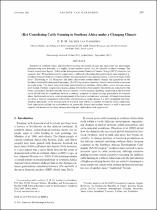JavaScript is disabled for your browser. Some features of this site may not work without it.
- ResearchSpace
- →
- Research Publications/Outputs
- →
- Journal Articles
- →
- View Item
| dc.contributor.author |
Archer, Emma RM

|
|
| dc.date.accessioned | 2012-04-17T09:42:07Z | |
| dc.date.available | 2012-04-17T09:42:07Z | |
| dc.date.issued | 2011-10 | |
| dc.identifier.citation | Archer, E.R.M. 2011. (Re)Considering cattle farming in Southern Africa under a changing climate. Weather, Climate and Society, vol. 3(4), pp 249-253 | en_US |
| dc.identifier.issn | 1948-8327 | |
| dc.identifier.uri | http://journals.ametsoc.org/doi/abs/10.1175/WCAS-D-11-00026.1 | |
| dc.identifier.uri | http://hdl.handle.net/10204/5774 | |
| dc.description | Copyright: 2011 American Meteorological Society | en_US |
| dc.description.abstract | Scientists in southern Africa and elsewhere focusing on climate change and agriculture are increasingly demonstrating how livestock, as a highly climate sensitive sector, may be affected by climate change. The Fourth Assessment Report (AR4) of the Intergovernmental Panel on Climate Change (IPCC) observes, for example, that “Projected increased temperature, combined with reduced precipitation in some regions (e.g., Southern Africa) would lead to increased loss of domestic herbivores during extreme events in drought-prone areas” (Easterling et al.). Response and policy discussions around climate change and agriculture in the Southern African Development Community (SADC) region have, however, thus far tended to focus far more on staple crops. The latest projected future temperatures for southern Africa show a clear increase across most models. Further, temperatures in exceedance of tested livestock comfort thresholds are indicated for the future, particularly for those months of most concern to cattle farmers. Enabling adaptation in the livestock sector should thus be a significant focus of a country’s response to climate change, particularly in countries where the livestock sector is a critical component of the formal and informal economy. Although innovations are often a primary component of livestock adaptation plans under design, it is now recognized that longstanding approaches to the management of livestock may well have valuable lessons for future adaptation. Such approaches include the reintroduction of genetically diverse and resilient breeds, as well as increased support and incentives for those farmers planning and undertaking such approaches. | en_US |
| dc.language.iso | en | en_US |
| dc.publisher | American Meteorological Society | en_US |
| dc.relation.ispartofseries | Workflow;8098 | |
| dc.subject | Southern African climate change | en_US |
| dc.subject | Southern African livestock | en_US |
| dc.subject | Southern African cattle farming | en_US |
| dc.subject | Animal studies | en_US |
| dc.subject | Livestock adaptation | en_US |
| dc.title | (Re)Considering cattle farming in Southern Africa under a changing climate | en_US |
| dc.type | Article | en_US |
| dc.identifier.apacitation | Archer, E. R. (2011). (Re)Considering cattle farming in Southern Africa under a changing climate. http://hdl.handle.net/10204/5774 | en_ZA |
| dc.identifier.chicagocitation | Archer, Emma RM "(Re)Considering cattle farming in Southern Africa under a changing climate." (2011) http://hdl.handle.net/10204/5774 | en_ZA |
| dc.identifier.vancouvercitation | Archer ER. (Re)Considering cattle farming in Southern Africa under a changing climate. 2011; http://hdl.handle.net/10204/5774. | en_ZA |
| dc.identifier.ris | TY - Article AU - Archer, Emma RM AB - Scientists in southern Africa and elsewhere focusing on climate change and agriculture are increasingly demonstrating how livestock, as a highly climate sensitive sector, may be affected by climate change. The Fourth Assessment Report (AR4) of the Intergovernmental Panel on Climate Change (IPCC) observes, for example, that “Projected increased temperature, combined with reduced precipitation in some regions (e.g., Southern Africa) would lead to increased loss of domestic herbivores during extreme events in drought-prone areas” (Easterling et al.). Response and policy discussions around climate change and agriculture in the Southern African Development Community (SADC) region have, however, thus far tended to focus far more on staple crops. The latest projected future temperatures for southern Africa show a clear increase across most models. Further, temperatures in exceedance of tested livestock comfort thresholds are indicated for the future, particularly for those months of most concern to cattle farmers. Enabling adaptation in the livestock sector should thus be a significant focus of a country’s response to climate change, particularly in countries where the livestock sector is a critical component of the formal and informal economy. Although innovations are often a primary component of livestock adaptation plans under design, it is now recognized that longstanding approaches to the management of livestock may well have valuable lessons for future adaptation. Such approaches include the reintroduction of genetically diverse and resilient breeds, as well as increased support and incentives for those farmers planning and undertaking such approaches. DA - 2011-10 DB - ResearchSpace DP - CSIR KW - Southern African climate change KW - Southern African livestock KW - Southern African cattle farming KW - Animal studies KW - Livestock adaptation LK - https://researchspace.csir.co.za PY - 2011 SM - 1948-8327 T1 - (Re)Considering cattle farming in Southern Africa under a changing climate TI - (Re)Considering cattle farming in Southern Africa under a changing climate UR - http://hdl.handle.net/10204/5774 ER - | en_ZA |






